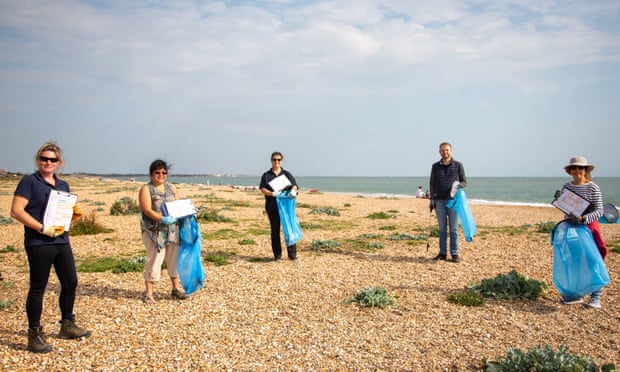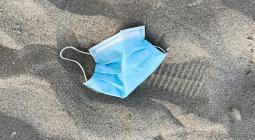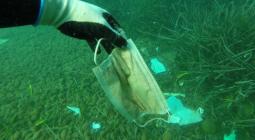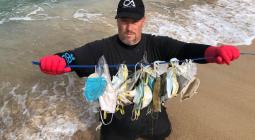Face masks and gloves found on 30% of UK beaches in clean-up.

Conservation volunteers find PPE items in nearly a third of areas targeted in annual drive.
Discarded masks and other items of personal protective equipment were found on nearly a third of beaches surveyed by beach-cleaning volunteers this autumn.
The Marine Conservation Society’s annual beach clean found items of PPE on 30% of the areas they cleaned up.
The most common items of pollution found in coastal areas were pieces of plastic or polystyrene, plastic takeaway cup lids, and wet wipes.
Volunteers carried out beach cleans in 385 coastal areas in September, covering 43,958 metres of beach.
This year, due to the coronavirus crisis, PPE featured for the first time on the beaches surveyed. Masks and gloves were also found by volunteers in 69% of inland litter picks.

Lizzie Prior, the Great British Beach Clean coordinator at the Marine Conservation Society, said: “The amount of PPE our volunteers found on beaches and inland this year is of concern. Considering mask-wearing was only made mandatory in shops in England in late July, little more than three months before the Great British Beach Clean, the sharp increase in PPE litter should be a warning for what could be a new form of litter polluting our beaches in the future.”
Like many other single-use items, disposable face masks and gloves posed a threat to wildlife on land and at sea, she said. Marine animals could mistake face masks and gloves for prey, filling their stomachs with materials that will not break down and could prove to be fatal. Animals also risk being tangled in the straps of face masks, with seabirds’ feet pictured recently being wrapped in the elastic strings.
Drinks litter continues to be found on UK beaches, with an average of 30 drinks containers, caps and lids found per 100 metre of beach surveyed this year. Inland, almost all litter picks (99%) found drinks litter.
Dr Laura Foster, head of clean seas at the Marine Conservation Society, said: “This year’s data … shows just how crucial it is that Wales, England and Northern Ireland follow in the footsteps of Scotland and urgently introduce an all-inclusive deposit return scheme. The government has said it will introduce a DRS but only from 2023.
“Despite lockdown, with many of us spending more time at home, littering in public spaces has continued unabated. Almost every single local litter pick found at least one drinks container, which is incredibly concerning. An effective deposit return scheme would take the UK one step closer to a circular economy model and drastically reduce the volume of single-use pollution in the UK’s streets, parks and on our beaches.”
The five most common litter items found on UK beaches
1 Plastic and polystyrene pieces (0-50cm) – 167.2 found per 100 metre of beach surveyed
2 Plastic and polystyrene caps and lids – 19.7
3 Wet wipes – 17.7
4 Cigarette stubs – 16.2
5 Plastic string – 15.8
6 November 2020
The Guardian




